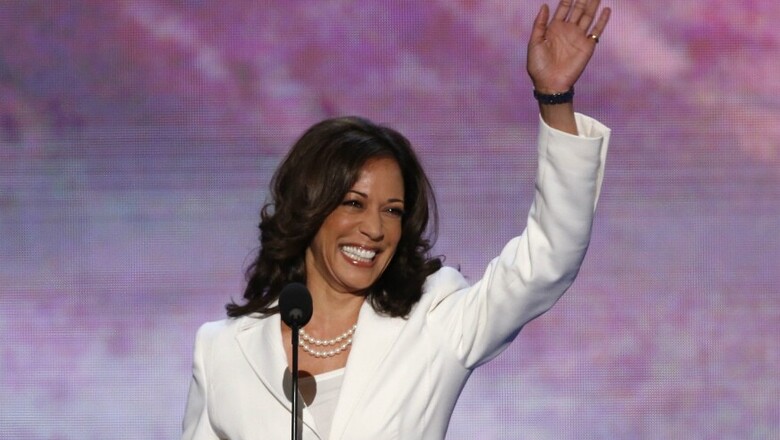
views
Democrat trailblazer Kamala Harris pulled the plug on her US presidential campaign Tuesday after a promising start to her bid was eroded by underperforming in a crowded field and a failure to raise sufficient funds.
The exit of the progressive senator leaves 15 candidates in the battle to see who challenges President Donald Trump in the November 2020 election. Harris has been a fierce Trump critic, repeatedly calling for his impeachment.
He reacted to her withdrawal by tweeting, "Too bad. We will miss you" — to which Harris quickly replied, "Don't worry, Mr. President. I'll see you at your trial."
Her departure, following weeks of campaign turmoil, shines a light on the disruptive potential of a self-funding candidate like billionaire Mike Bloomberg, the former mayor of New York. Having stagnated in fifth place in polling, with under four percent support, Harris was bumped to sixth spot after Bloomberg's recent entry.
"I've taken stock and looked at this from every angle, and over the last few days have come to one of the hardest decisions of my life," the 55-year-old Californian told supporters in an email.
"My campaign for president simply doesn't have the financial resources we need to continue. I'm not a billionaire. I can't fund my own campaign."
It was a parting swat at Bloomberg and billionaire activist Tom Steyer, both of whom have spent millions of dollars in broadcast and online advertising. It was also a telling revelation about the piles of cash that candidates need to mount a viable campaign.
"Kamala is right — our system is deeply broken when billionaires can buy their way in," tweeted liberal Senator Elizabeth Warren, one of several presidential hopefuls to quickly thank Harris for her campaign. Harris has been a political ground-breaker, only the second black woman elected to the US Senate.
'Mixed emotions'
She rocketed into White House contention with a stirring campaign launch in January, on Martin Luther King Jr's birthday, before 20,000 onlookers. But her prospects slid in recent months as she struggled to define her positions on domestic issues including health care.
She antagonised voters by suggesting in January, and again in a debate, that she sought to eliminate private health insurance to make way for universal health coverage.
Harris is one of the biggest names to date to leave the race, along with former congressman Beto O'Rourke of Texas and New York Mayor Bill de Blasio. She had jousted with Democratic frontrunner Joe Biden in the party's first presidential debate in June, when she attacked him on his positions on race and school busing.
It provided a breakout for the candidate, who saw her support rise to — and peak at — 15 percent in polling. But that viral moment proved to be a strategic miscalculation; she suffered a months-long slide while Biden's support largely held steady.
Harris recently invoked the need to rebuild the "Obama coalition" — African Americans, Hispanics, women, independents and millennials who together swept Barack Obama to victory in 2008 — in order to defeat Trump. But Biden, who for eight years served as Obama's vice president, has managed to maintain pole position among black voters.
Harris is a former prosecutor and one-time attorney general for California whose steely demeanor can give way to a million-watt smile. Her candidacy was noteworthy in the era of Trump: as a black American daughter of immigrants, Harris appeared to be the "American dream" incarnate, mounting a challenge to a president whom many Democrats denounce as the nation's divider in chief.
Biden said he had "mixed emotions" about Harris dropping out. "She is a first-rate intellect, a first-rate candidate and a real competitor." Harris was the third candidate to quit the race in recent days, along with low-polling Democrats Montana Governor Steve Bullock and former congressman Joe Sestak.



















Comments
0 comment